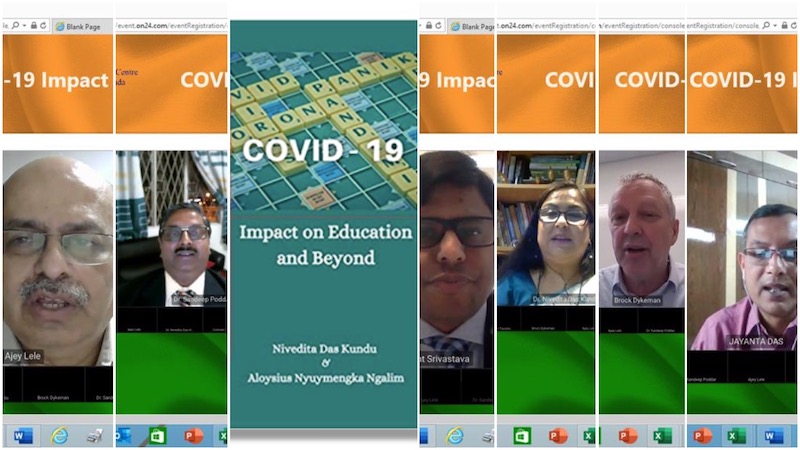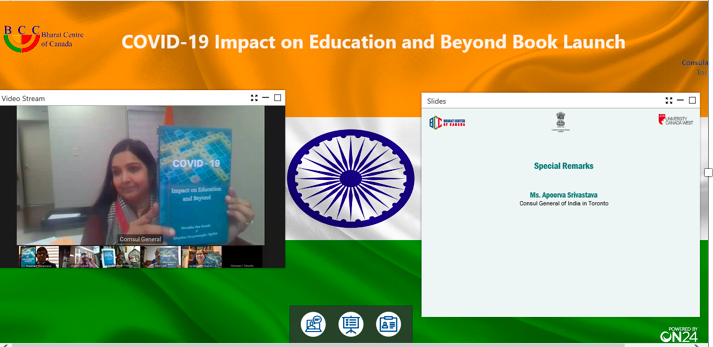 Covid19 & Education
Covid19 & Education
‘COVID-19 Impact on Education and Beyond’ launched online in Toronto, book offers insight into a key problem
Toronto/IBNS: Although the impact of COVID-19 pandemic on the economy has taken precedence over matters, its impact on the education sector has not been any less. In fact, developing countries like India are still trying to come to terms with the shift from traditional classroom teaching to that online.
The book "COVID-19 Impact on Education and Beyond" therefore fulfils a critical need in the present situation.
This timely publication looking into the current pandemic situation and its impact on education was launched online by Bharat Centre of Canada - a policy think tank and University Canada West in collaboration with the Consulate General of India (CGI) in Toronto.
Brock Dykeman, President-Vice Chancellor, University Canada West launched the book and Dykeman briefly described the pandemic's challenges and how the University Canada West tackled the difficulties and aligned its teaching and learning process, in his key address.
He said that international students faced lot more challenges as they had to continue with the online classes from their home country.
For new international students, it was impossible to join a university in person because visa offices were closed in different countries, which also made it difficult for international students to travel during the pandemic time.
He appreciated the book’s editors and authors' timely initiative about researching on the Covid-19 pandemic and its implications on education.
He said teaching and learning had to switch to online education, changing the instruction modes and the learning management system.
He also expressed his concerns about significant policy impact, mainly about government organizations' considerable cost with the economic shut-down and the economic subsidies given to all sorts of industries, institutes, etc.
He also shared his concern on the Covid-19 pandemic impact because of its long-lasting factor.
Dr. Nivedita Das Kundu, President-Bharat Centre of Canada (BCC), and Faculty, York University, the editor and also a chapter author of the book, briefly introduced the book. She said the book deals with teaching and learning methods used by the educational institutions during the lockdown.
She explained that the book’s chapters are based on practical experiences, and assessment of the situation by prominent academics, practitioners and university teachers from different countries.
She said the book is divided into three sections - the first section gives a broad overview of the "teaching and learning experiences during the pandemic," the second section presents "societal effect and schooling during the pandemic," and the third section attempts to analyse "e-learning and community concerns during a pandemic."
This book also depicts the impact on the social and economic sectors along with the education sector.
The chapters include case studies from different countries in Africa, Asia, Europe and North America, depicting how different nations responded to the pandemic surprises.
Dr. Ajey Lele, Distinguished Expert, Bharat Centre of Canada, Senior Fellow, Manohar Parrikar Institute for Defence Studies and Analyses, one of the chapter authors, explained that the book's uniqueness lies in its outlining the impact of Covid-19 on the education system.
Dr. Lele discussed his contribution to the book, about education in India and how India handled this pandemic situation.
He said that though teachers and students' communities had ensured that the spread of the COVID-19 virus would not impact their education, offline education will start again post Covid-19 period as soon as things get back to the normal.
Dr. Sandeep Poddar, Deputy-Vice Chancellor (Research and Innovation), Lincoln University College, Malaysia, expressed his concern that it has already been one year with Covid-19, but still, the cases are increasing rapidly.
He said how the United Nations Sustainable Development Goal (UNSDG) for quality education is the central pillar of society as it supports all the 17 SDGs of the United Nations.
Dr. Poddar emphasized that many countries in Southeast Asia, including Indonesia and Malaysia, face similar technical challenges. He also discussed the practical aspects of teaching which cannot be imparted through online education, such as laboratory experiments etc.
Also, he expressed concern about mental health issues.
Dr. Poddar stressed that as social media usage has increased during the pandemic time, which is good, but is also causing depression among youngsters. He compared the present situation with Darwin’s theory of the struggle for existence.
Dr. Jayanta Das, Faculty, Bharat Centre of Canada, Peripheral Vascular Surgeon, AMRI Hospital, emphasised on the impact of Covid -19 on the educational system, and how it has affected everybody in every corner of the world.
Dr. Das mentioned that India has supplied Covid vaccines to more than 84 countries to date, including to countries such as the UK, Canada and Argentina, to name a few.
According to Dr. Das, Covid-19 has fundamentally changed everyone in every field, including education.
He said nearly all the countries are struggling, and the scholarly world and academic institutions are not any exceptions.
Dr. Das emphasized that through the online education systems, knowledge can be imparted but the parameters for physical activity and social activity cannot be fulfilled.
Dr. Das said that at this juncture there is no other avenue which is sustainable to impart knowledge and education to the students, so this is the reason why everyone has to adjust with the online teaching and learning methods.
Apoorva Srivastava, Consul General of India in Toronto congratulated the authors and editors, and said the COVID-19 pandemic has brought massive changes to everything, including education.
Srivastava explained that the entire global education system came to a standstill due to the covid-19 pandemic.
However, online studies have emerged as an alternative to in-person learning because of the digital platforms.

She expressed her concern for the children forced to undertake online lessons and distance learning, and related problems, such as rising mental health issues because of a lack of social connection.
She acknowledged that the book is a timely one and will help understand the pandemic's impact on education and beyond. She also applauded India's effort to launch the world's largest vaccination drive and suggested India could serve the world population by sending vaccines to countries.
She said that India has become the second-largest producer of PPE (Personal Protective Equipment) kits in the world. She also said that the India-Canada education partnership has many note-worthy accomplishments, with over 230,000 Indian students present in Canada.
She said that India is the largest source for incoming international students to Canadian universities and colleges.
Consul General Srivastava ended her special remarks congratulating Bharat Centre of Canada and University Canada West for taking up this initiative.
Programme moderator Prashant Srivastava, in his closing remarks, appreciated all the students and participants from different parts of the world for being a part of the Book Launch/ Book Discussion event.
He concluded the event on a positive note with the hope to continue with such educational and policy-oriented activities and programme jointly with BCC-UCW in association with CGI-Toronto.
Support Our Journalism
We cannot do without you.. your contribution supports unbiased journalism
IBNS is not driven by any ism- not wokeism, not racism, not skewed secularism, not hyper right-wing or left liberal ideals, nor by any hardline religious beliefs or hyper nationalism. We want to serve you good old objective news, as they are. We do not judge or preach. We let people decide for themselves. We only try to present factual and well-sourced news.







